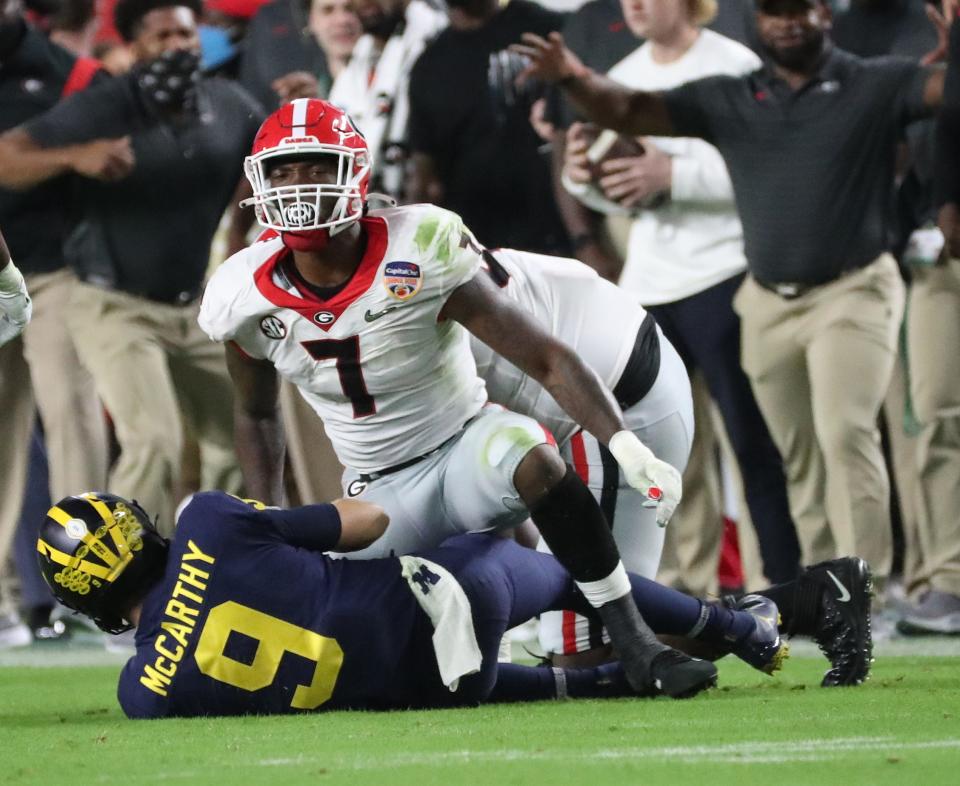Why Georgia's rout of Michigan is reminiscent of Michigan State's 2015 CFP collapse
MIAMI GARDENS, Fla. – Gemon Green dropped his head, and the Michigan football cornerback shook it ever so slightly as he glanced briefly at the celebration unfolding in the painted red end zone at Hard Rock Stadium.
James Cook had just slipped out of the backfield, cruised past the Wolverines’ last line of defense and scored on a 39-yard touchdown reception that accounted for Georgia’s last points in its 34-11 romp Friday. A party started on New Year’s Eve and the College Football Playoff’s lone Big Ten representative wasn’t invited.
“Sucks it’s got to end this way,” Michigan’s star pass rusher, Aidan Hutchinson, said afterward.
MICHIGAN GRADES: Offense, defense, coaching thoroughly outclassed by Georgia
COLUMN: Michigan doesn't belong on sport's top shelf, but loss won't spoil monumental year

Indeed it does.
Six years before, on the very same night, Michigan State experienced the same cold rejection.
Making its debut in the CFP, the Spartans were shut out literally and figuratively by a different SEC behemoth. Alabama exerted its supremacy during a 38-0 slaughter that reverberated long after the final whistle. In the coming years, the plucky program Mark Dantonio built into a regional stronghold disintegrated, and as it did some wondered if that resounding defeat to the Crimson Tide triggered the decline.
Here in South Florida the Wolverines are confident they won’t endure a similar downturn after they were wrecked by Georgia.
Instead, they proclaimed they’re built to last.
“Ton of resolve with this team,” head coach Jim Harbaugh said. “To me it feels like a start. Feels like a beginning.”
Harbaugh’s rosy outlook is understandable.
In Year 7 of his much-scrutinized tenure, he realized a series of breakthrough achievements. He finally led the Wolverines to a victory over rival Ohio State, a win he labeled his best yet. A week later, he guided his alma mater to its first Big Ten championship since 2004 and launched the program’s maiden voyage in the CFP.
“It was a great season,” Harbaugh said. “We were trying to make it greater tonight.”
But then Michigan ran into Georgia’s rapacious defense, which spent this fall devouring one opponent after another.
As Alabama did against Michigan State, the Bulldogs feasted on the Wolverines. They chewed their way through Michigan’s offensive line and swallowed its stable of running backs, sucking the life force out of Wolverines. U-M netted a season-low 88 rushing yards and entered the red zone only twice on its first eight possessions.
As Michigan’s offense stagnated, its defense hemorrhaged from front to back. The pass rush was blunted by Georgia’s quick passing game while the coverage collapsed across the second and third levels. Freshman linebacker Junior Colson surrendered a 53-yard completion to Cook that helped Georgia expand its lead in the second quarter. Not long thereafter, cornerback Vincent Gray was burned on a 57-yard touchdown strike to Georgia receiver Jermaine Burton.
The score was now 27-3, and the epitaph on Michigan’s 2021 tombstone was ready to be engraved.
[ Celebrate Michigan's College Football Playoff run with this new Free Press book! ]
As Harbaugh learned, death by the SEC is never a pleasant way to go, especially for programs aspiring to compete in college football’s Thunderdome.
In 2016, the Washington Huskies did as well when they ran up against Alabama in the semifinal round and never sniffed the CFP again.
After their dismal performances Friday, playoff newbies Cincinnati and Michigan could soon follow in their footsteps. But fifth-year safety Brad Hawkins believes the Wolverines will avoid that fate.
“All these young guys, they’ve got this scar tissue now, being in the Playoffs, losing, having to feel this,” he said. “I know they’re going to bounce back next year and give ‘em hell.”
When considering Michigan’s favorable 2022 schedule that includes three soft nonconference opponents and eight home dates, Hawkins’ optimism seems justified. Beat the Buckeyes again in Columbus, and it’s entirely conceivable Michigan could end up in the same position next year.
But outside of Tuscaloosa, nothing is guaranteed in this sport.
Harbaugh hinted at that when he said, “This team won’t be together fully next year.”
The Wolverines lose stalwarts like Hutchinson, running back Hassan Haskins and center Andrew Vastardis. Other contributors could leave as well.
The winning culture, linebacker Josh Ross insisted, will remain though.
“It’s just the beginning,” Ross reiterated.
That’s the hope at least. But as Michigan State knows, it could also be the end.
It’s Harbaugh’s responsibility to ensure that it isn’t. The man who steered the Wolverines to the CFP for the first time must find his way back in the near future and then maybe, just maybe, take the next step. Otherwise, the party will continue to go on without them.
Contact Rainer Sabin at rsabin@freepress.com. Follow him on Twitter @RainerSabin. Read more on the Michigan Wolverines, Michigan State Spartans and sign up for our Big Ten newsletter.
This article originally appeared on Detroit Free Press: Michigan football's loss reminds us of MSU's CFP collapse

